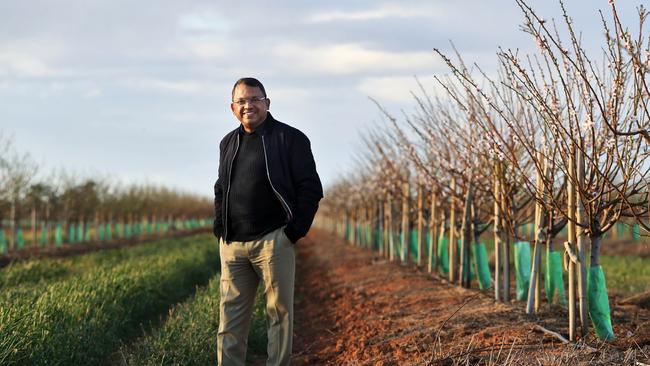Almonds flavour of month for Olam International
The newly-planted almond trees with their delicate flowers stretch like an endless carpet at Olam’s Kerarbury station.

The newly planted almond trees with their delicate white flowers stretch like an endless carpet for 9km of Kerarbury station, alongside the Murrumbidgee River between Narrandera and Hay on NSW’s rich Riverina plains.
It is a sight that delights Sunny Verghese, co-founder and group chief executive of Olam International, one of the world’s largest agricultural production, processing and trading companies, as he yesterday explored his latest Australian farm venture. Singapore-based Olam, 52 per cent-owned by the Singapore government’s sovereign wealth fund Temasek and 20 per cent by Japan’s Mitsubishi, is the world’s biggest grower of almonds, cashew nuts and cocoa beans, and a dominant global trader of coffee, rubber, cotton, pulses, grains, flour, rice, hardwood and dairy foods.
In the 28 years since being founded by Mr Verghese, Olam has grown to become a food and farming giant, with annual sales of more than $20 billion and a presence in 70 countries growing and supplying 47 agricultural commodities worldwide.
In Australia, where the company has invested more than $1.4bn, primarily in growing and processing almonds and, through its acquisition of Queensland Cotton in 2007, 10 cotton processing gins, Olam is the biggest almond farmer, water rights owner and a major cotton industry player, as well as a buyer of mung beans, chickpeas and cotton from other farmers.
It’s a presence backed by more than 300 permanent staff, and Mr Verghese is keen to grow as he believes agriculture in Australia leads the world in efficiency, innovative and profitability.
“We farm in 26 countries but see Australian agriculture as the most innovative in the world,” Mr Verghese said last night while touring new Olam almond orchards at Hillston and Darlington Point.
“My view is that because Australian farming systems — unlike other leading agricultural nations such as the US and Israel — have never been propped up by agricultural subsidies, that farmers here have been forced to be efficient, innovative and adopt world best practices to compete on world markets,” he told The Australian.
Mr Verghese points to the cotton industry, where Olam Australia is a key player in his global cotton business, as a prime example.
While Australian farmers face high costs and are expensive producers of cotton, they are also the most profitable because the resulting cotton is high quality, the yields are the best in the world at 12-15 large bales a hectare, and water use has been cut through innovation by more than 40 per cent in the past decade to the lowest among irrigated cotton growing nations.
It is one reason why, as well as owning six cotton gins in Queensland and four gins in northern NSW, Olam has just ventured into growing cotton and pulses itself on a 4000ha farm, Lenora Downs, near Rolleston in central Queensland.
But, like its 15,000ha of almond orchards — including the 11,500ha of established plantations on the Murray River near Robinvale bought after the collapse of Timbercorp — unusually Olam is not the owner of the land or the almond trees. Instead Mr Verghese and Olam International have adopted a “capital-lite” model of farming food and other commodities.
In this system, passive investors own the land and permanent tree crops, while Olam pays a long-term lease fee for the right to manage and farm the property and generate profit.
“The thinking behind this is that we’re not investing in agricultural farmland and potential capital gains from the land value, but in the business that can be done on its surface,” Mr Verghese explains.
“Our capability — what we are good at — is capturing the production economics of the land, so we don’t need to actually own that land as long as we can capture the production from the trees.”
This rare model resulted in specialist agricultural funds manager Laguna Bay and its Adveq Almond investor trust paying $200 million to buy 11,500ha of land and established almond orchards near Robinvale from Olam in 2013, and then lease them back to Olam again.
In turn, the move freed up capital for Olam to build its large new almond processing plant south of Mildura.
In the case of the new almond orchards currently being planted on Kerarbury Station and Hillston — and the new Queensland pilot cotton farm — the land and young trees are owned by investors in listed Rural Funds Group.
However, Mr Verghese predicted that before global accounting standards relating to such sale-and-leaseback arrangements change from January 2019, it may be time for Olam to experiment with new farm capital funding and ownership models.
“I suspect we will move to a model that is more like an operating lease, where there is more sharing of both the farming risks and the resulting profits,” Mr Verghese said.
But despite its capital-lite model of investment, Olam does not skimp when it comes to owning major water entitlements along the Murrumbidgee and Murray rivers to ensure it can always irrigate its valuable tree crops, even if it does not own the trees. Mr Verghese said this practice would not change, even when it expanded its holdings into other tree and nut crops, including walnuts and macadamias.
“We may have operations in 70 countries but it is Australia that has the most sophisticated water management system in the world,” Mr Verghese said.
“I know you think it is difficult here but your system always allows for water to go to the best productive and highest value use; unless water is valued properly like here in Australia it will never be used most efficiently and saved.”




To join the conversation, please log in. Don't have an account? Register
Join the conversation, you are commenting as Logout